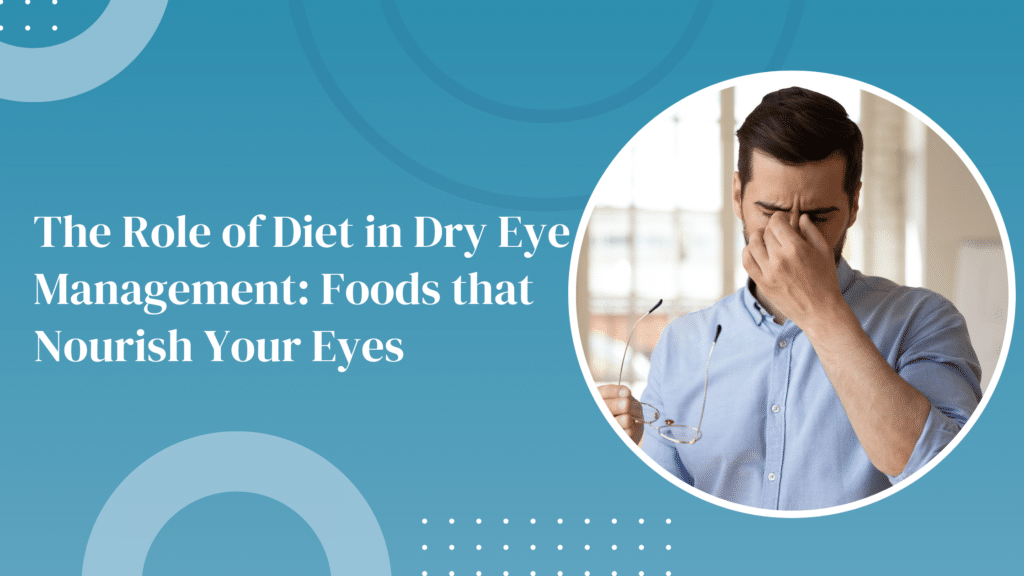
Dry eye syndrome affects millions of people worldwide, causing discomfort, irritation, and potential long-term damage to the eyes. While various factors contribute to this condition, including environmental factors and underlying health issues, diet and nutrition play a crucial role in managing dry eye symptoms and promoting overall eye health. In this blog, we’ll dive into how diet influences dry eye syndrome and explore foods rich in omega-3 fatty acids and other essential nutrients that support optimal eye health.
Understanding Dry Eye Syndrome and its Causes:
Dry eye syndrome occurs when the eyes fail to produce enough tears or when the tears evaporate too quickly. This leads to a lack of moisture and lubrication on the eye’s surface, resulting in symptoms such as itchiness, redness, burning sensation, and blurred vision.
Several factors can contribute to dry eye syndrome, including:
- Environmental Factors: Exposure to dry or windy climates, air conditioning, and heating systems can exacerbate dry eye symptoms.
- Age: The risk of developing dry eye increases with age, as tear production typically decreases over time.
- Health Conditions: Certain medical conditions such as diabetes, thyroid disorders, and autoimmune diseases can affect tear production.
- Medications: Antihistamines, decongestants, and antidepressants are among the medications that can contribute to dry eye symptoms.
The Role of Diet in Dry Eye Management:
While we often associate dry eye syndrome with external factors, the foods we consume can significantly influence tear production and eye health. Incorporating a balanced diet rich in essential nutrients can help alleviate dry eye symptoms and promote overall ocular wellness.
Key Nutrients for Eye Health:
- Omega-3 Fatty Acids: These essential fatty acids are renowned for their anti-inflammatory properties, which can help reduce eye inflammation associated with dry eye syndrome. Omega-3s also support the production of tears and promote tear film stability. Fatty fish such as salmon, mackerel, sardines, and trout are excellent sources of omega-3 fatty acids.
- Vitamin A: Crucial for maintaining healthy vision, vitamin A plays a vital role in the production of tears and the protection of the eye’s surface. Foods rich in vitamin A include carrots, sweet potatoes, spinach, kale, and liver.
- Vitamin C: As a powerful antioxidant, vitamin C helps protect the eyes from oxidative stress and inflammation. Citrus fruits, strawberries, bell peppers, and broccoli are excellent sources of vitamin C.
- Vitamin E: Like vitamin C, vitamin E acts as an antioxidant, protecting the eyes from damage caused by free radicals. Nuts, seeds, spinach, and avocados are good dietary sources of vitamin E.
- Zinc: This mineral is essential for maintaining healthy vision and supporting the function of the eye’s tear glands. Incorporate zinc-rich foods such as beef, poultry, oysters, and legumes into your diet.
To effectively manage dry eye symptoms and support optimal eye health, consider incorporating the following foods into your regular meals:
- Fatty Fish: Aim to consume fatty fish like salmon, tuna, and trout at least twice a week to ensure an adequate intake of omega-3 fatty acids.
- Leafy Greens: Add spinach, kale, and Swiss chard to salads, soups, and smoothies to boost your vitamin A and antioxidant intake.
- Colorful Fruits and Vegetables: Incorporate a variety of colorful fruits and vegetables such as carrots, sweet potatoes, berries, and bell peppers into your diet to provide essential vitamins and antioxidants.
- Nuts and Seeds: Snack on almonds, walnuts, chia seeds, and flaxseeds for a healthy dose of vitamin E and omega-3 fatty acids.
- Lean Protein Sources: Include lean meats, poultry, eggs, and legumes in your meals to ensure an adequate intake of zinc and other essential nutrients.
Incorporating a nutrient-rich diet that includes omega-3 fatty acids, vitamins A, C, and E, and zinc can play a significant role in managing dry eye syndrome and promoting overall eye health. By making conscious food choices and prioritizing eye-friendly foods, you can nourish your eyes from within and help alleviate dry eye symptoms for improved comfort and visual clarity. If you are suffering from symptoms of dry eye, schedule an appointment today at Regional Eye Center!





